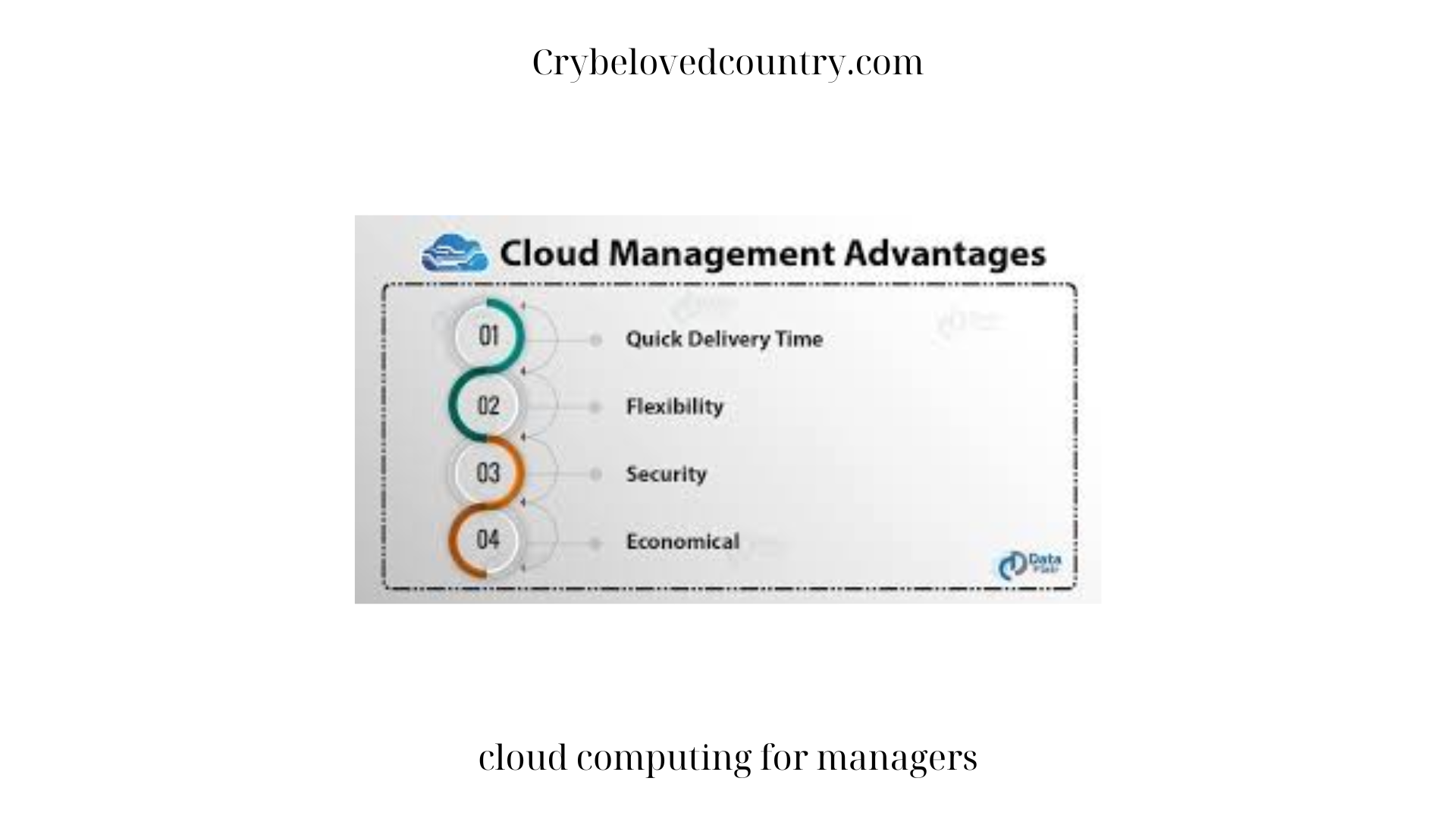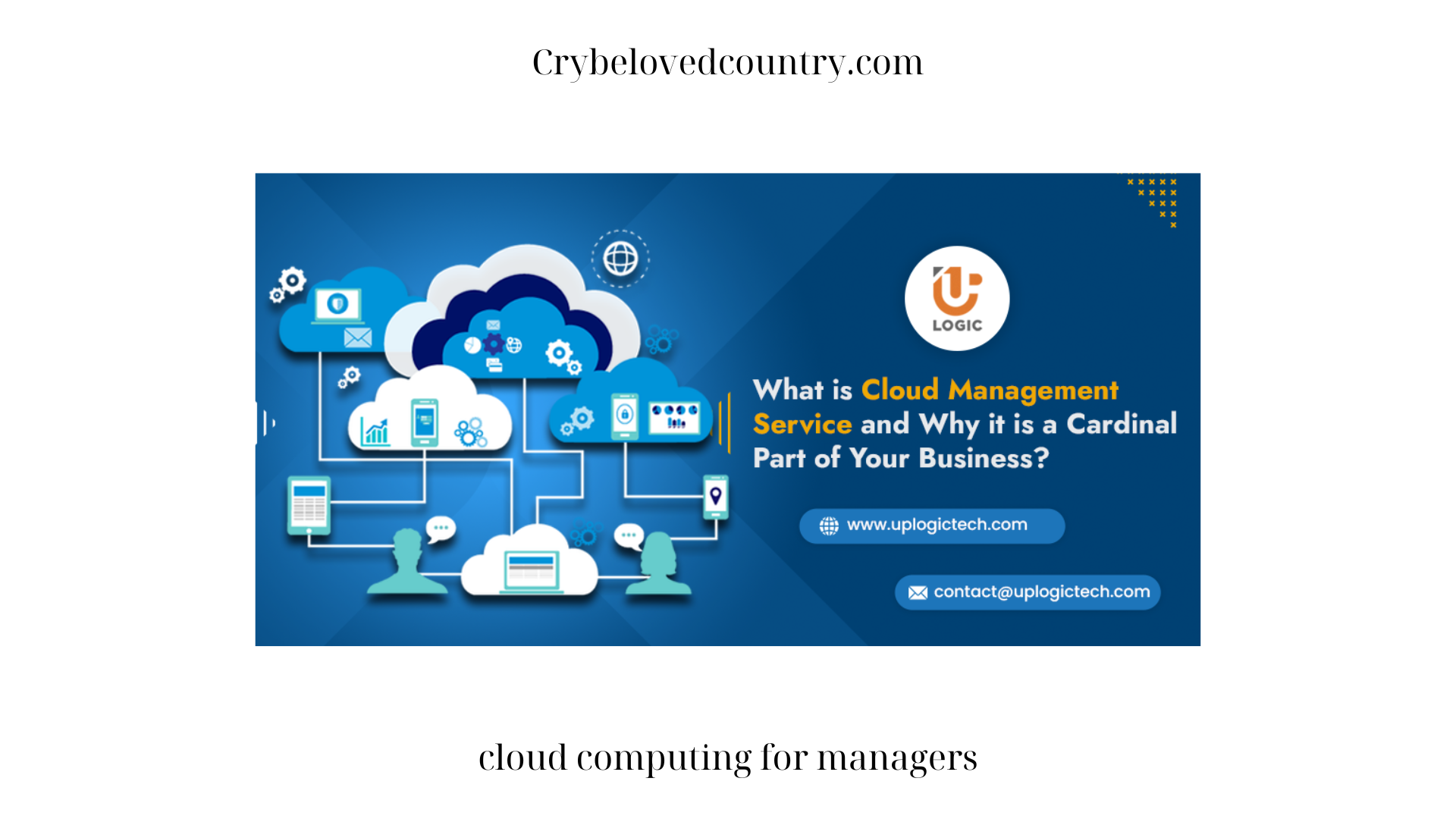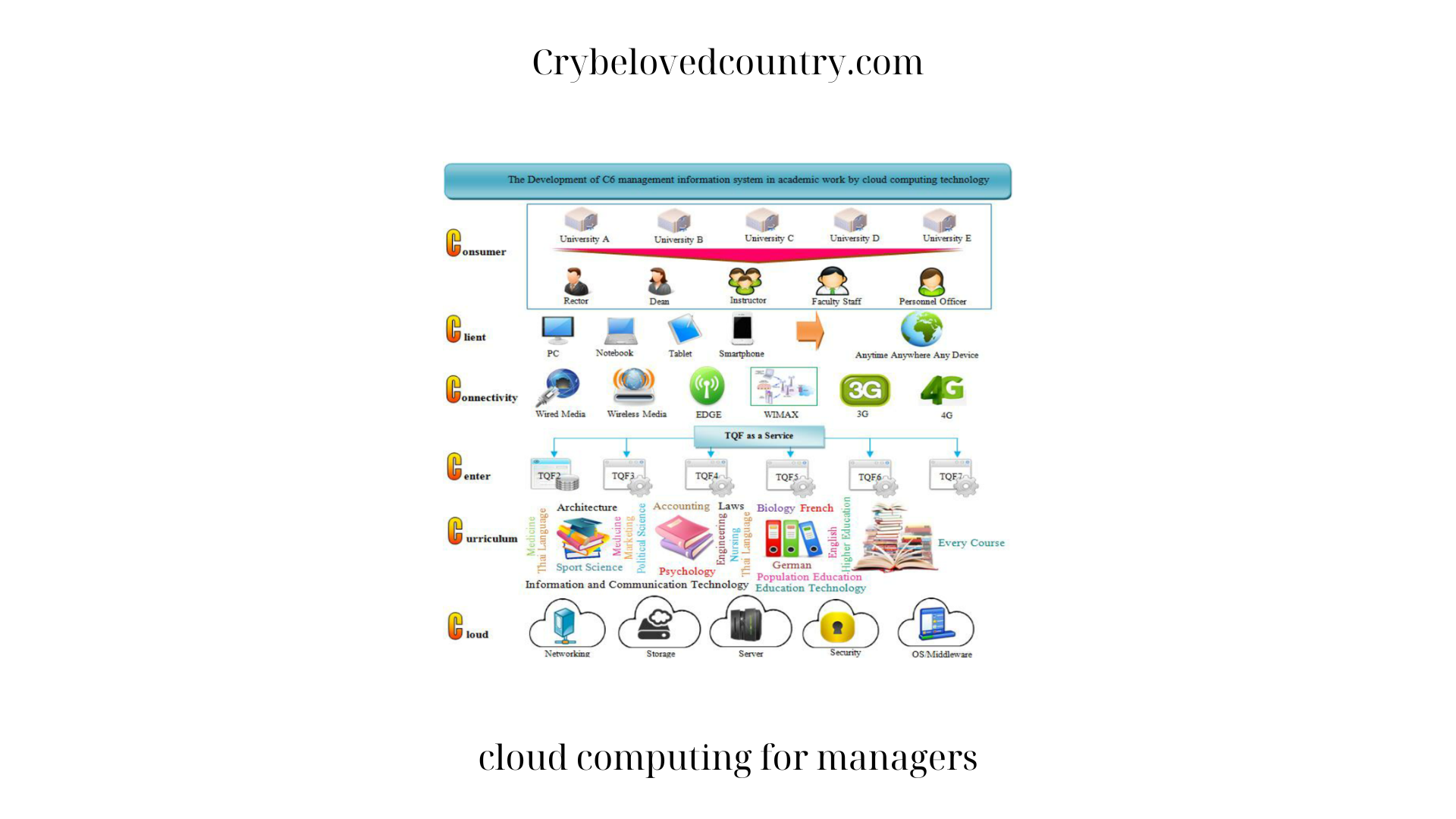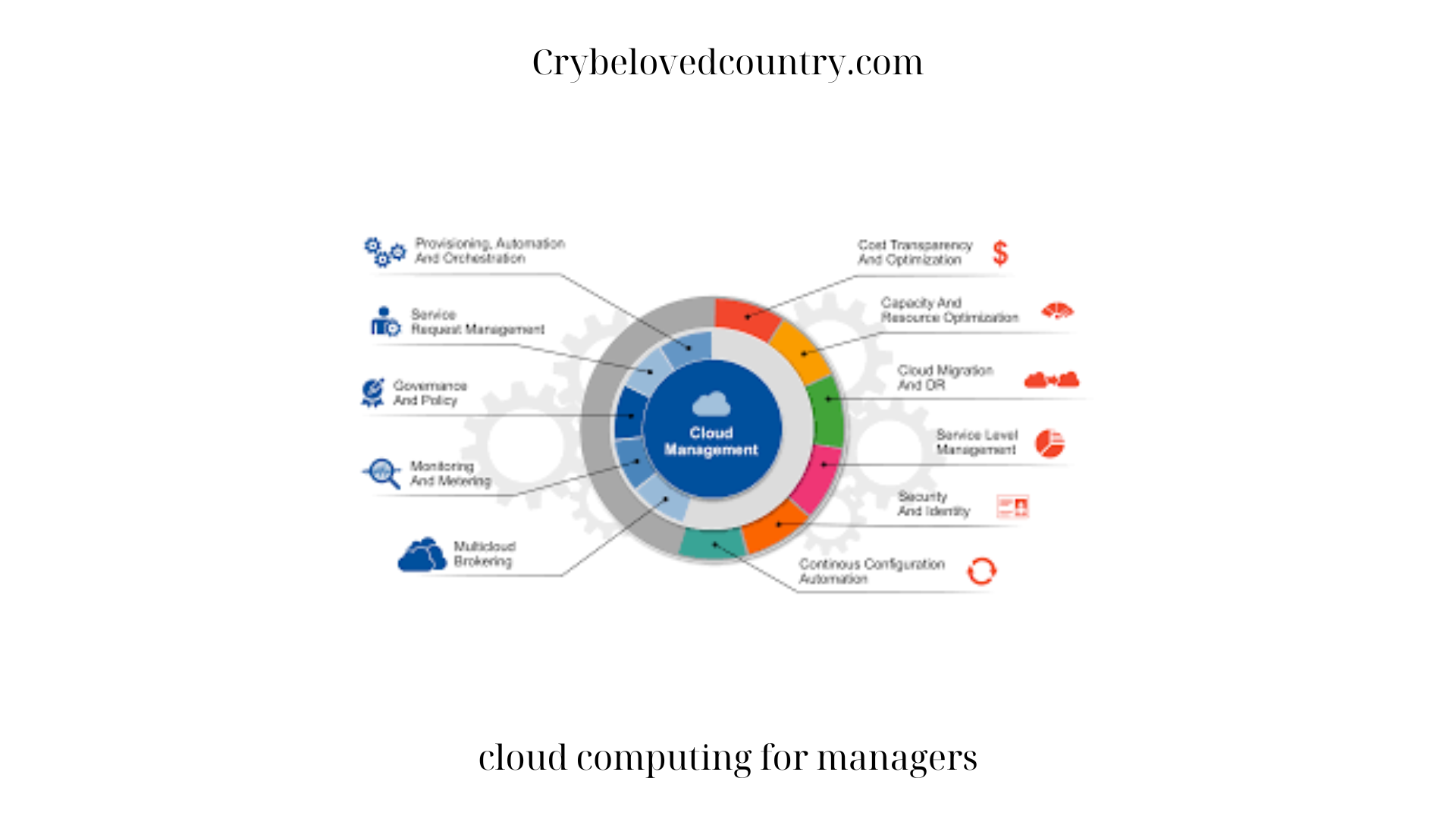In today’s digital age, cloud computing has emerged as a transformative technology that is revolutionizing the business landscape. As a manager, understanding cloud computing and its implications is crucial for staying competitive and driving organizational success. This comprehensive guide by Crybelovedcountry aims to provide managers with a solid foundation of knowledge about cloud computing for Managers, its cloud computing for managers, challenges, and practical applications in a business setting.
Cloud Computing for Managers: A Comprehensive Guide

What is Cloud Computing?
At its core, cloud computing for managers refers to the delivery of computing services, including servers, storage, databases, networking, software, and analytics, over the internet. Instead of relying on local servers or personal computers, cloud computing enables businesses to access and utilize these resources on-demand, paying only for what they use. The cloud infrastructure is typically owned and managed by a third-party provider, allowing organizations to focus on their core competencies while leveraging the scalability, flexibility, and cost-efficiency of cloud services.
Benefits of Cloud Computing for Managers:
Cloud computing offers a multitude of benefits for managers and their organizations. Firstly, it provides unparalleled scalability, allowing businesses to scale their computing resources up or down based on demand. This agility enables managers to respond quickly to market changes, accommodate growth, and optimize resource allocation. Additionally, cloud computing offers cost savings by eliminating the need for upfront investments in hardware, infrastructure, and maintenance. Paying for cloud services on a subscription or pay-as-you-go basis helps manage costs and improves budget predictability.
Another significant advantage of cloud computing for managers is enhanced collaboration and remote access. With cloud-based tools and applications, managers can foster seamless collaboration, allowing teams to work together on projects regardless of their physical location. This flexibility promotes productivity, streamlines workflows, and supports remote work arrangements.
Security and data protection are paramount concerns in the digital era, and cloud computing addresses these issues effectively. Cloud service providers invest heavily in robust security measures, including data encryption, access controls, and regular backups, reducing the risk of data loss or breaches. This allows managers to confidently leverage cloud services while maintaining the integrity and confidentiality of their business data.

Types of cloud computing for managers:
Cloud computing for managers encompasses various service models that cater to different business needs. The three primary service models are:
- Infrastructure as a Service (IaaS): This model provides virtualized computing resources, such as virtual machines, storage, and networks, allowing businesses to build their own IT infrastructure within the cloud. Managers can have complete control over the operating systems, applications, and configurations, providing maximum flexibility and customization.
- Platform as a Service (PaaS): PaaS offers a development platform and environment in the cloud, enabling businesses to build, deploy, and manage applications without the complexity of underlying infrastructure. Managers can focus on application development and innovation, while the cloud provider manages the underlying infrastructure, including servers, storage, and databases.
- Software as a Service (SaaS): SaaS delivers ready-to-use applications and software over the internet, eliminating the need for installation and maintenance. Managers can access a wide range of business applications, such as customer relationship management (CRM), enterprise resource planning (ERP), or project management, on a subscription basis. SaaS provides convenience, rapid deployment, and automatic software updates.
Considerations and Challenges for Managers:
While the benefits of cloud computing for managers are significant, managers need to be mindful of certain considerations and challenges. One critical aspect is vendor selection. Choosing a reputable and reliable cloud service provider is essential to ensure data security, compliance with regulations, and uninterrupted service availability. Managers should carefully evaluate providers based on their track record, data center locations, security certifications, and customer support.
Data governance and compliance are crucial areas that managers must address when adopting cloud services. It is essential to understand data residency, privacy regulations, and legal requirements related to data storage and processing, especially when dealing with sensitive customer information or operating in highly regulated industries. Compliance with standards such as the General Data Protection Regulation (GDPR) or the Health Insurance Portability and Accountability Act (HIPAA) should be a priority.
Another challenge is cloud computing for managers integration with existing IT infrastructure. Managers need to assess the compatibility of their legacy systems, applications, and databases with cloud services. Integration solutions, such as application programming interfaces (APIs) or middleware, can help bridge the gap between on-premises and cloud environments, enabling seamless data flow and process integration.
Additionally, managers should consider the potential impact of cloud computing for managers or service disruptions on their operations. Despite robust service level agreements (SLAs) offered by cloud providers, occasional downtime can occur. Planning for business continuity, backup, and disaster recovery strategies is essential to minimize the impact of any service interruptions.

Practical Applications of Cloud Computing:
Cloud computing offers a vast array of practical applications across industries and functional areas. Some notable examples include:
- Data Analytics and Business Intelligence: Cloud-based analytics platforms enable managers to derive valuable insights from vast amounts of data, facilitating data-driven decision-making and strategic planning.
- Collaboration and Communication: Cloud-based collaboration tools, such as project management software, document sharing platforms, and video conferencing applications, support seamless communicationand collaboration among team members, regardless of their physical location.
- Customer Relationship Management (CRM): Cloud-based CRM systems provide a centralized database for managing customer interactions, sales pipelines, and marketing campaigns. Managers can access real-time customer data, track performance metrics, and improve customer engagement.
- Human Resources Management: Cloud-based HR systems streamline employee data management, payroll processing, performance evaluations, and recruitment processes. Managers can efficiently handle HR tasks, access employee information, and ensure compliance with labor regulations.
- E-commerce and Online Retail: Cloud-based e-commerce platforms enable cloud computing for managers to set up and manage online stores, process transactions securely, and track inventory. The scalability and flexibility of cloud infrastructure support the growth of online retail businesses.
- Software Development and Testing: Cloud-based development platforms provide developers with the tools and resources to build, test, and deploy applications rapidly. Managers can accelerate software development cycles, reduce costs, and improve time-to-market.
- Big Data Processing: Cloud computing offers the computational power and storage capacity required for processing large volumes of data in real-time. Managers can leverage cloud-based big data platforms to extract valuable insights and support data-intensive applications.
- Disaster Recovery and Backup and cloud computing for managers: Cloud-based backup and recovery solutions provide computing with secure data storage and disaster recovery capabilities. In the event of a system failure or data loss, managers can quickly restore critical business data and resume operations.
Conclusion:
Computing has become an integral part of modern business operations, and managers play a vital role in harnessing its potential. This comprehensive guide has provided managers with an overview of cloud computing, its benefits, challenges, and practical applications. By understanding the different service models, considering relevant factors, and making informed decisions, managers can leverage computing to drive innovation, increase efficiency, and gain a competitive edge in today’s dynamic business landscape. Embracing cloud computing as a strategic tool empowers managers to lead their organizations towards a more agile, scalable, and technologically advanced future.
